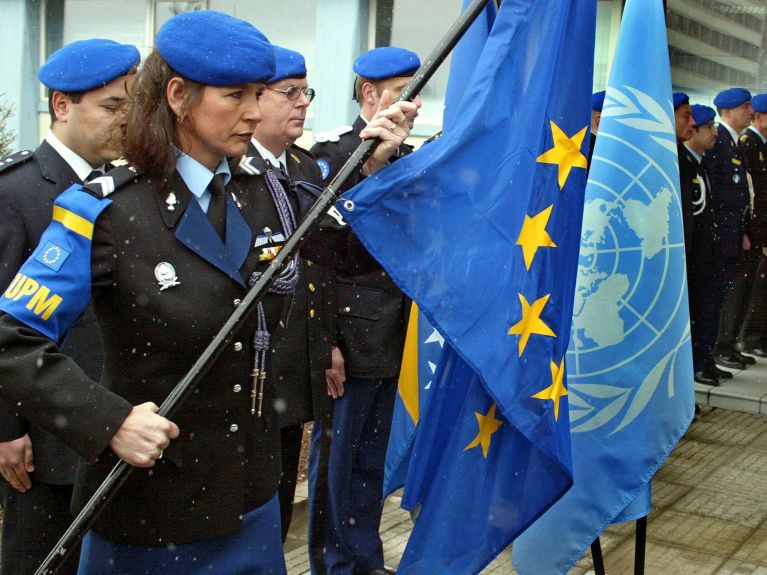Cooperation and trust
The United Nations and the European Union have cooperated in over 30 peacekeeping operations. A review.

The Charter of the United Nations confers primary responsibility for maintaining international peace and security on the UN Security Council in Article 24 and then, in the following articles, describes the plethora of instruments it has at its disposal for that purpose. From the very outset, however, the founders of the UN saw very clearly that for a variety of political reasons it could make sense for a regional organisation to assume this responsibility. The Charter accordingly envisages the possibility of regional arrangements or agencies for this purpose in Chapter 8. The prerequisite for this is that such arrangements or agencies and their activities should be consistent with the purposes and principles of the United Nations.
The Common Security and Defence Policy
The European Union (EU) is one of these regional organisations, although that was not the case from the very beginning. It was only with the emergence of the Common Security and Defence Policy (CSDP) at the end of the 1990s that the EU gradually developed the political will and the necessary civilian and military capabilities to become active in conflict and crisis management.
The primacy of the UN here is reflected in the fact that the necessary prerequisite for any such action by the EU is not only a decision by the Council of Ministers, but also a mandate from the Security Council in accordance with Chapter 7 of the UN Charter.
The EU carried out its first operations in 2003: a police mission in Bosnia-Herzegovina and then, a little later, in Macedonia and the Democratic Republic of Congo, the first two military missions that can be characterised as peacekeeping operations on behalf of the UN. Since then over 30 missions have shaped a specific EU approach to crisis management which differs from that of other international organisations, but at the same time faces a multitude of similar challenges to many of the peacekeeping operations conducted by the UN.
Relations with the United Nations
From the very start, EU operations had a special functional relationship with UN operations. This was because they sometimes replaced them, as in Bosnia, for example, or were conceived as having a support role, as was the case in the Democratic Republic of Congo. In recent years, the EU has continued this cooperation model with independent, but UN-supporting missions in Mali and the Central African Republic.
In essence, the activities of the two organisations also have many similarities. Both the EU and the UN only send peacekeeping troops with the consent of the host country and aim to strengthen local or national institutions. Both seek to avoid risk in the course of their activities and have a reserved attitude towards robust peace enforcement. And finally both feel they have an obligation to uphold political impartiality in their operations. Furthermore, both organisations cover the whole range of possible conflicts – conflict prevention, peacekeeping and peace enforcement measures as well as stabilisation efforts after conflicts have ended.
That is why the EU and the UN use a similar mix of civilian and military instruments with the goal of maintaining security in a very broad sense, securing the rule of law and good governance, if necessary reforming the security sector, protecting human rights and supporting a country’s reconstruction.
The institutionalisation of cooperation
Ultimately, the EU and also the UN face similar challenges. Their peace missions frequently only enjoy little political support in their member states. Furthermore, it is often difficult to anchor individual missions in an appropriate overall political strategy and sometimes peace missions are confronted by dwindling approval in the respective country as well as an insecure environment in which they can only fulfil their duties with difficulty.
Therefore, in addition to cooperation in the field, both organisations have institutionalised their relations beginning with two joint declarations in the years 2003 and 2007. Both documents defined joint communication channels and coordination mechanisms. Thus, for example, it was agreed that a UN-EU Steering Committee should meet twice a year and that the UN departments responsible for peace and security open a liaison office in Brussels. Then, the 2012 Action Plan on CSDP Support to UN Peacekeeping and the 2015 UN-EU Strategic Partnership on Peacekeeping and Crisis Management defined several areas of cooperation that are of central significance for peacekeeping measures: rapid intervention capabilities, support for the African Union (AU) in this policy area, larger contributions to UN missions from EU member states, cooperation in the development of the rule of law and the reform of the security sector, collaboration on logistics questions and, finally, improvements in the exchange of information and analyses.
The institutionalisation of cooperation
Ultimately, the EU and also the UN face similar challenges. Their peace missions frequently only enjoy little political support in their member states. Furthermore, it is often difficult to anchor individual missions in an appropriate overall political strategy and sometimes peace missions are confronted by dwindling approval in the respective country as well as an insecure environment in which they can only fulfil their duties with difficulty.
Therefore, in addition to cooperation in the field, both organisations have institutionalised their relations beginning with two joint declarations in the years 2003 and 2007. Both documents defined joint communication channels and coordination mechanisms. Thus, for example, it was agreed that a UN-EU Steering Committee should meet twice a year and that the UN departments responsible for peace and security open a liaison office in Brussels. Then, the 2012 Action Plan on CSDP Support to UN Peacekeeping and the 2015 UN-EU Strategic Partnership on Peacekeeping and Crisis Management defined several areas of cooperation that are of central significance for peacekeeping measures: rapid intervention capabilities, support for the African Union (AU) in this policy area, larger contributions to UN missions from EU member states, cooperation in the development of the rule of law and the reform of the security sector, collaboration on logistics questions and, finally, improvements in the exchange of information and analyses.
European contributions
The attention of the United Nations especially focuses on the question of the material contributions of individual EU members or the EU as a whole. This is because time and again it has proved difficult to generate the necessary military capabilities for UN peace missions. There have been repeated proposals that the EU should make complete units available to the UN – for example, the Battlegroups that were set up in 2007 – and train and equip them appropriately. The EU member states actually contribute 35 to 40% of the UN budget for peace missions and, in light of France’s and the United Kingdom’s permanent membership of the UN Security Council, also play a substantial role in defining the relevant mandates. Simultaneously, however, for over twenty years now, Europeans have shown great restraint when it comes to providing their own troop contingents. No more than 4 to 8% of the soldiers in UN-led operations come from Europe. They often tend to involve the deployment of individual staff officers to the headquarters of UN operations.
The readiness of EU member states to provide troop contingents for UN operations has weakened not least as a result of the EU’s independent profile in this area. A significant return to UN peace missions by European countries has only been discernible since 2013 following the establishment of the MINUSMA operation in Mali in West Africa, which aims to facilitate the stabilisation of the country through a political resolution of the conflict between the government and rebels. Alongside forces from the Netherlands, Sweden, the United Kingdom, Italy, Ireland and other partners, the German Bundeswehr has been participating in this multidimensional mission since July 2013. The stationing of four German combat helicopters and four transport helicopters began in March 2017. At the beginning of February 2019, 840 Bundeswehr soldiers were stationed in Mali as part of the 13,300-strong troop contingent.
You would like to receive regular information about Germany? Subscribe here:


